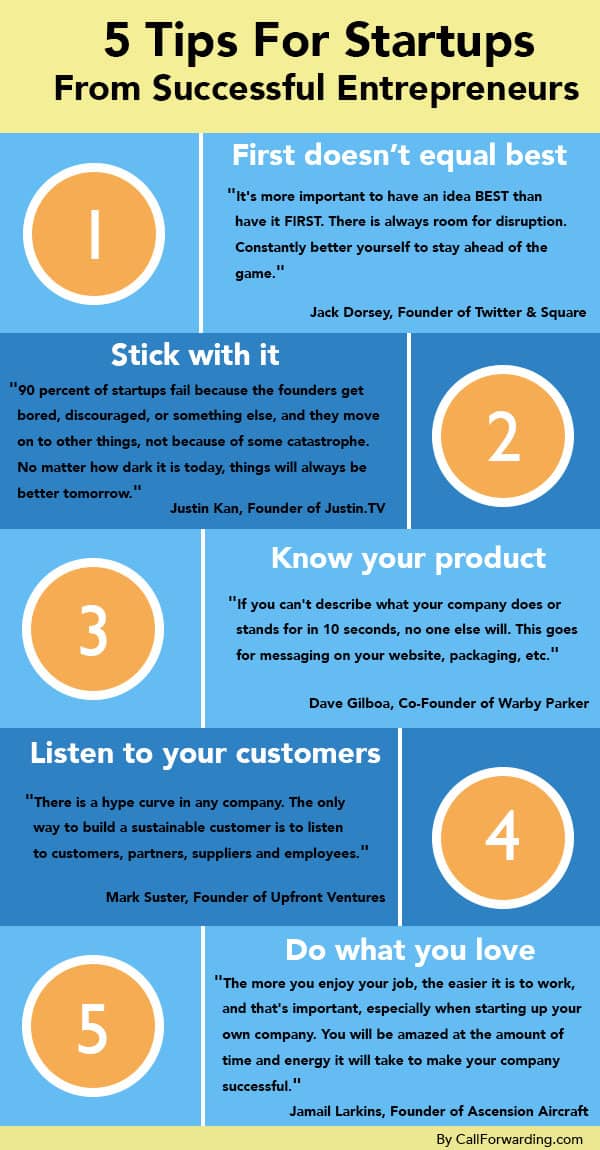5 Tips for Startups and Entrepreneurs
We’re showing 5 tips for startups to help you beat the odds on survival and to be the company that grows.
Fewer than one hundred of the over 500,000,000 startups created in 2013 will see long-term success. Although your innovation and drive may be abundant, the odds are against you. We understand how unnerving the initial process can be. So as your unofficial business startup and growth company cheerleaders and motivators, we want to share some helpful business tips and advice with you.
Rome wasn’t built in a day, and neither were Apple or Microsoft. Every startup has to begin somewhere, and we can guarantee that every successful entrepreneur has experienced ups and downs at some point. Maybe you’ve just hired your first round of employees, or perhaps you’ve hit a hiccup and feel like you’re on a downward spiral. Either way, you’re working 90 hour weeks and keeping a close eye on your cash.
We’ve selected 5 helpful business tips from the founders of some of the top companies in the world, in hopes that their words will guide you to where you need to be, or at least give you some encouragement about where your startup stands today.
5 Tips for Startups and Entrepreneurs
1. First doesn’t equal best
A lot of people are under the assumption that you must come up with some completely new product or service in order to start a great company, but that’s a common misconception. You don’t need to be the first person to think of the idea. Instead, you need to think of the best idea, or a way to improve upon something that already exists. This can include finding a new form, function, presentation, or application for an existing idea.
For example, large reel-to-reel tape decks were available in the early 1960’s, and they recorded great music. However, you’d need a wheelbarrow to move a reel-to-reel tape deck around. Sony miniaturized the tape deck and enclosed the reels in a cassette, creating the 1979 Sony Walkman. This instant commercial success revolutionized the music industry, even though is was just a change in form to technology that already existed.
Look at Mark Zuckerberg, the founder of Facebook. He didn’t create the first networked communications tool (Lotus Notes), nor did he create the first social networking site (hello, MySpace), but he instead used the currently technology as a building block for what would become the most popular social networking site (so far) in history.
2. Stick with it
As the saying goes, “when the going gets tough, the tough get going.” So many startups succumb to the fear of failure, but that doesn’t mean yours will. Every successful entrepreneur will tell you that they got where they are today because they took risks.
Maybe you’re not scared of failure. Maybe you just have a myriad of business ideas. Well, before you decide to jump on the next business venture, take a moment to think if it’s the right time to get that project off the ground, or if your focus should be on your current endeavor.
3. Know your product
In order to efficiently present your product to customers, you need to have a thorough understanding of what it is and why the customers need it. How can you expect customers to want your product if you can’t succinctly describe what it is? Whether it’s a description on your website, or copy on your packaging — keep it short and sweet.
Going further, startups that grow often take the time to understand how their customers are using the products or service provided. Visiting and talking with customers is a proven approach to understanding your product as viewed by your customers.
4. Listen to your customers
As an entrepreneur, you have a million things on your mind throughout the day. But your number one priority should be your customers. This biggest mistake you can make is creating a product that no one wants. Even if you do everything else right, but miss this step, you’ll fail.
With the advent of social media, you can gain insight on your customers before you even start marketing to them. Listening to customer comments and questions via email, Twitter, Pinterest, and other popular media give you invaluable information about how things are going and what you need to do to meet customer needs.
5. Do what you love
If you do what you love, then you never work a day in your life. I’m not sure who said it first, but I know that many people wish they could say the same. Fortunately for you, you’re an entrepreneur, and hopefully your business involves something that you love. Whether it’s the product, the creation process, or the satisfaction you receive knowing that you’re creating what will (hopefully) become a legacy, choose an industry that speaks to you.
5 Tips for Startups Resources:

